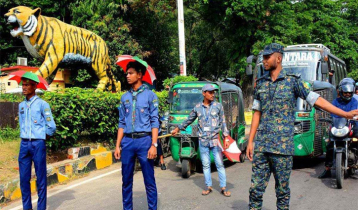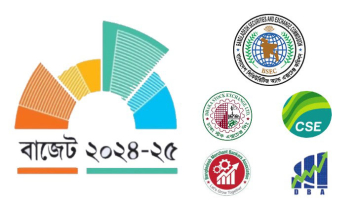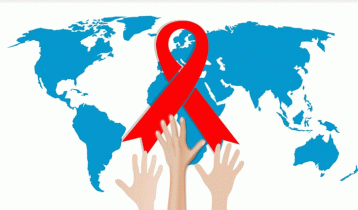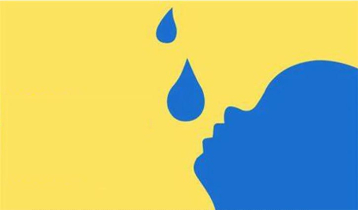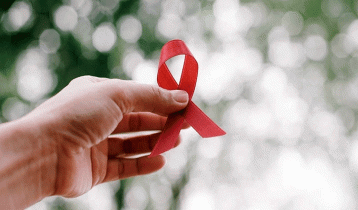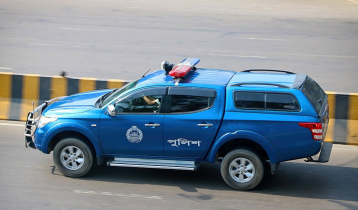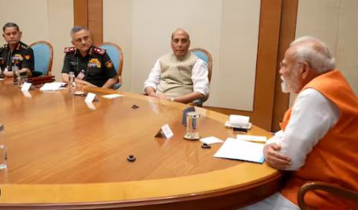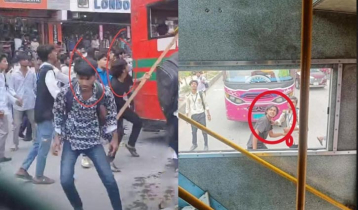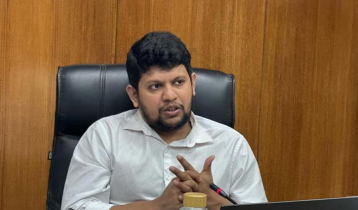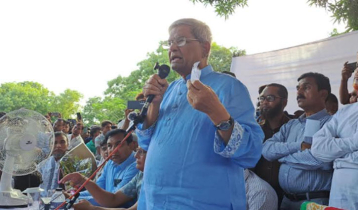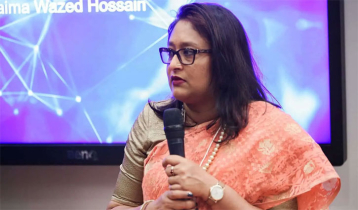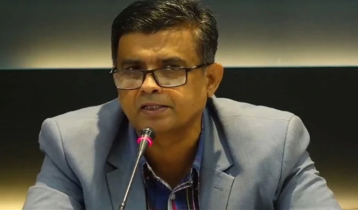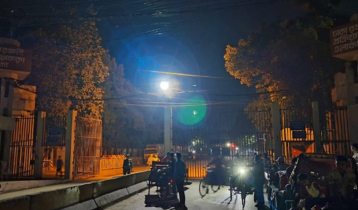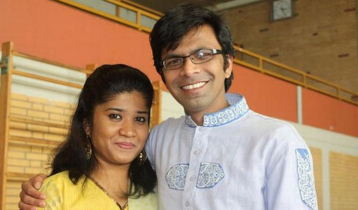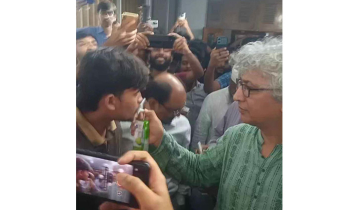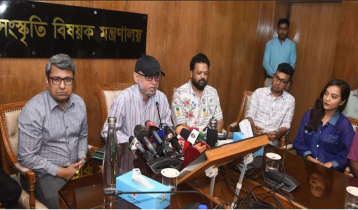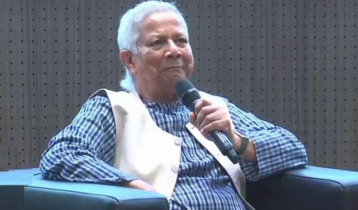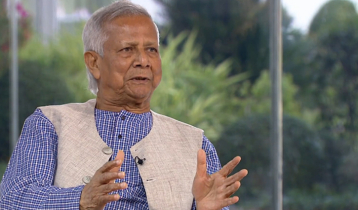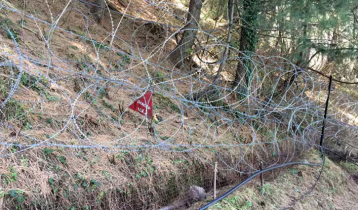Climate change impacts put children at risk
Easmin Akter || risingbd.com
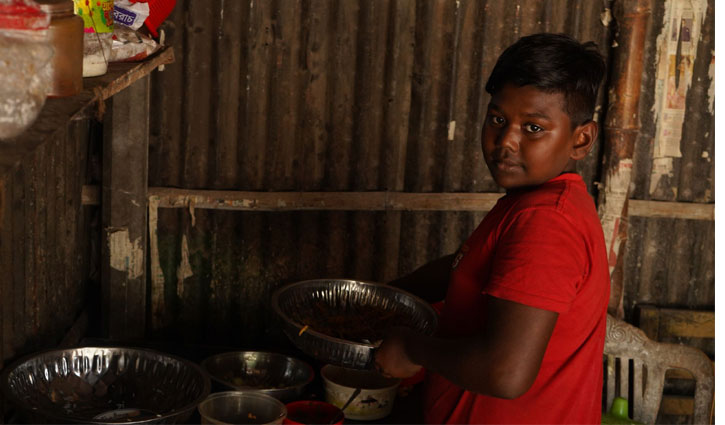
Nahid works at a food hotel in Kalyanpur. Photo: risingbd
Nahid was a fifth-grade student at a government school in Charfashan upazila of Bhola. In July 2023, he moved to a slum in Kalyanpur located in the capital Dhaka with his family. He had been working at a food hotel in Kalyanpur when I spoke to him.
Nahid says, “Here I have to work from 5 am to 10 pm. It pays me Tk 3,000 per month. When asked if you want to go to school or not, Nahid says, “I work all day long. What time do I go to school?” Nahid says, “We came to Dhaka being forced. All our houses were swept away by the flood. I have my mother, father, and younger sister in the slum.”
Many students, like Nahid are dropping out of school every year. Climate change causes floods in Bangladesh. In addition, storms and waves are increasing, and sea level is increasing. Many families are forced to leave their homes due to floods. Children are also refugees with them. Children’s lives are becoming vulnerable due to climate change.
Children are at high risk of drowning in floods, which is already one of the leading causes of child mortality in the country. Children take shelter with their families in overcrowded shelters during floods. Schools are closed, and exams are cancelled. In this situation, children’s education is further disrupted.
Tahmina Akhter was studying in the fifth grade at a school in Underchar of Noakhali. Tahmina’s family took shelter in a relative’s house after their house was destroyed in the Meghna River two years ago. The number of members in her family is six. Tahmina got married in 2022 when she was 14 years old. After one year of marriage, she moved to a slum in Kalyanpur of the capital Dhaka with her husband. A few months ago, Tahmina gave birth to a baby girl. In reply to the question, how was the school life? Tahmina thought for a while and said with a sigh, “School life was full of fun, I liked the classes. I thought I would become a doctor after the end of my education.”
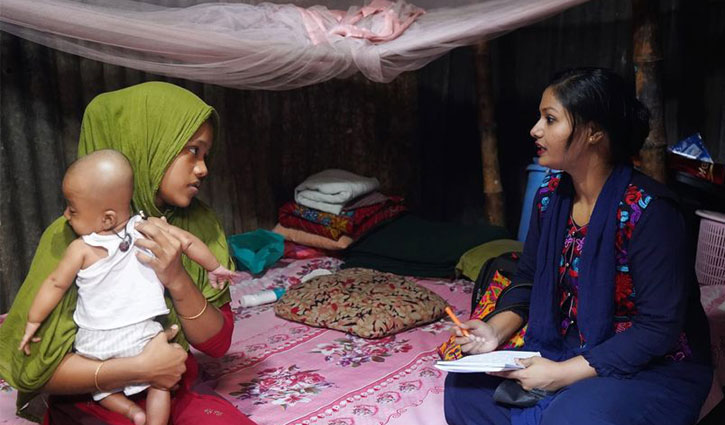 Reporter Easmin Akter speaking to Tahmina Akhter. Photo: risingbd
Reporter Easmin Akter speaking to Tahmina Akhter. Photo: risingbd
Monirul, a child from Ulipur Upazila in Kurigram, sells vegetables in a small market in Mirpur, Dhaka. In the morning, Monirul’s father bought vegetables from the storehouse and went to pull rickshaw. Monirul sits in the market all day and sells those vegetables. Monirul’s family came to Dhaka when their house was submerged in a flood three years ago. He used to study at a primary school in his own area.
Monirul said that his father is a rickshaw puller, and his mother works as a maid. He has a baby sister. His mother sometimes goes to work with her and sometimes leaves her in the market with Monirul. Monirul was asked whether he wants to go back to school? In reply, he said, “That will not happen again. Our family has to bear a lot of expenses. My parents don’t want to send me to school.”
Nazrul Mia is a fourth-grade student at a school in Phulchari Upazila of Gaibandha. He moved to a slum in Mirpur of Dhaka with his family in June last year, as his house was submerged in a flood. Here in Dhaka, he sells hog plum and guava. Nazrul’s father is a nut seller, and his mother works as a domestic help in different houses. Nazrul has three more brothers and sisters.
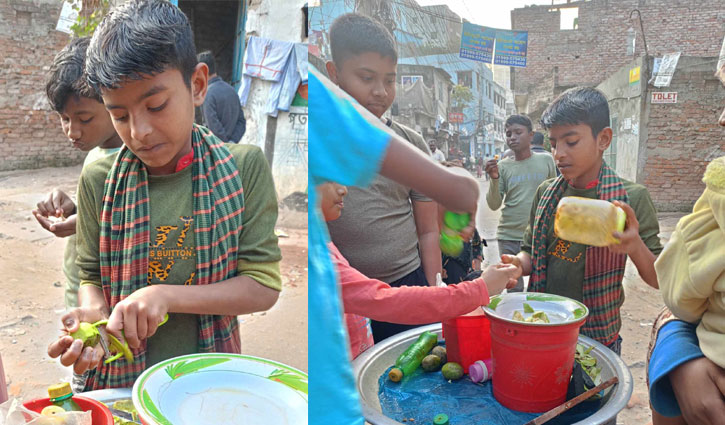 Nazrul Mia sells hog plum and guava in the streets. Photo: risingbd
Nazrul Mia sells hog plum and guava in the streets. Photo: risingbd
Being a riverine country, the risk of disasters, especially storms, floods, and river erosion, is relatively high in Bangladesh. 44 percent of the total population of the country are children. Thus, experts think that natural disasters and climate change pose a threat to these kids’ lives.
According to UNICEF, most children in urban slums do not attend primary school. And children in disaster-prone areas have even fewer opportunities to go to school. According to the organization’s research, about 17 lakh children are engaged in hazardous labour in the country. One in four of them is 11 years old or younger. Many girls work as domestic workers.
Most of the children living in slums in and around Dhaka work in tanneries, launch yards, tailor shops, and automobile factories. Many work in the fruit and vegetable markets as pullers and as porters at bus stands or railway stations. Most of them came to Dhaka as refugees from various disaster-prone districts.
Educationist professor Shafi Ahmed said that climate change is a big loss for a country like Bangladesh. In the last four to five years, 300 schools in various districts of the country, including North Bengal, have been washed away in rivers due to the erosion of various rivers, including Padma, Jamuna, and Dharla. By doing this, children are going to different places, including urban areas, with their families. Families are already poor, and their family income is decreasing. In many cases, there is no opportunity to get admission to another school. Even if children have the opportunity to study, they do not want to. Children cannot return to a normal learning environment. They are falling behind being subjected to various discriminations. Destitute parents are being forced to send them to work.
Children are involved in crimes while doing various jobs. In some cases, these children are being used for drug trafficking. Future generations are growing up depressed and suffering from overall discrimination. For those children who are leaving one area and have migrated to another area due to climate change, arrangements should be made for their admission to other public and private schools, and additional books should be kept for them in advance.
Abu Sadat Moniruzzaman Khan, Head of Climate Change Program at BRAC, said that children develop a relationship and friendship with the place where they grow up. When children move with their families from the place where they grew up due to climate change, they face different challenges in adapting to the new environment. Children who used to go to school in the village do not have the opportunity to study again when they go to the slums in the city. Due to increased salinity in water, a lack of fresh water hinders their physical growth. Apart from this, there are various health problems like diarrhea, skin diseases, and other diseases.
He also said that the government has several projects on education and nutrition, but they are less than the demand. Besides, non-governmental development organizations are working to protect children’s nutrition and education.
SB/AI

